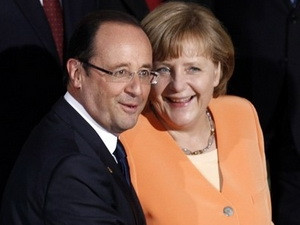EU Summit: Waiting for a new direction
The first meeting in Berlin between new French President François Hollande and German Chancellor Merkel, although considered to "promise a good start", still did not dispel doubts about the storms that may arise in the process of determining a complete economic recovery and budget balance policy that can be applied to Europe in the coming time.
The first meeting in Berlin between new French President François Hollande and German Chancellor Merkel, although considered to "promise a good start", still did not dispel doubts about the storms that may arise in the process of determining a complete economic recovery and budget balance policy that can be applied to Europe in the coming time.
By successfully forcing the theme of growth onto the agenda at Camp David, Hollande has officially expressed his opposition to his German counterpart. Aside from the Greek issue, the opposing views between the two countries will make the upcoming debates on budgets and growth in Europe more intense than ever.

French President Hollande and German Chancellor Merkel. (Source: Reuters)
At the G8 summit at Camp David and on the sidelines of the NATO summit in Chicago, Hollande’s “activism” has inadvertently helped to isolate the German Chancellor, the “Iron Lady” of the European Union. In order not to be alone, Merkel will initiate a formal debate on the evening of May 23 in Brussels, where EU leaders will meet “at the foot of the Greek volcano” to consider possible measures and means to bring Europe back to growth. Will Hollande find the support of a majority to consolidate the “growth camp”?
People still remember how "excited" the new French President was when he emphasized to the journalists present at Camp David, in front of Mrs. Merkel's disappointed face. Obviously, he was very satisfied with his "introduction" and with the "successful" pressure on the German Chancellor at a conference like the G8.
The fact that growth is at the heart of the G8 agenda has certainly made Mrs Merkel nervous. She will not be alone in Brussels in the coming days, but the presence of the French president seems to be making her uneasy.
In the final G8 communique, leaders of the richest industrialized countries sought to bring the two sides closer together by declaring that “growth and fiscal tightening will go hand in hand.”
According to analysts, this statement will pave the way for France and Germany to find a compromise solution that has been predicted. That is, the EU will not have to renegotiate the Budget Treaty, which 25 members have signed and several countries have ratified. And the French president will have to accept that his proposal on growth and jobs will be considered an “inevitable supplement”, or an “important” annex to the Budget Treaty.
However, that is just a prediction and the reality is much more complicated. The problem is that if Mrs. Merkel accepts Mr. Hollande's proposal to stimulate growth in the context of having to find every way to balance the state budget, she will have to accept a series of "impossible" requirements.
While other issues, such as adjusting the mandate of the European Central Bank, are considered easier to reconcile the views of France and Germany, the request to issue Eurobonds, which a French journalist compared to a red cloth waved in front of the German leader, remains the issue that is most difficult to find consensus on.
Before leaving for Brussels, the French president said he expected European leaders to have a “frank debate” and “everything on the table” to develop a common growth strategy for the whole Union. Hollande stressed that “this package will include Eurobonds and I will not be the only one to propose this, I confirm that.” Germany’s immediate reaction? “It is not a remedy for the crisis.”
In fact, so far only Italian Prime Minister Mario Monti has expressed this support, but still cautiously. At Camp David, he dared only to speak of “a progression towards Eurobonds.”
Moreover, there is still a blur between the issuance of bonds in the name of common eurozone public debt, an instrument that the German Chancellor is adamantly against, and common bonds to finance large European projects (Projects bonds), which are considered “acceptable”. Mario Monti said he would organize a trilateral summit in Rome in early June to “bring positions closer together.”
After all, although he found support from other leaders at the G8 Summit, Mr. Hollande's proposal is still a story of the EU. The French president will not be able to impose his views if the Socialist Party and other left-wing parties do not win a majority of seats in the upcoming legislative elections, and Berlin is also very interested in this election in France.
On the contrary, the German Chancellor reiterated that she will not use the gains and losses in the EU for domestic political purposes. This means that the defeat of the Christian Democratic Party in the recent election in the most populous state of North Rhine-Westphalia in Germany will not undermine her austerity policy./.
According to (Vietnam+) - DT






